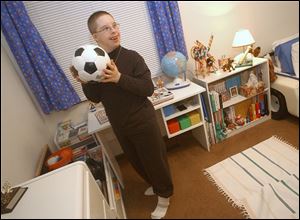
Shriners get boy back on his feet
4/18/2002
Aaron Bar, 13, at his home, is able to walk again as a result of corrective surgery through the Shriners organization.
Until a couple of years ago, Susan Bar's knowledge of the Shriners was pretty limited.
“I remembered the clowns,” she said of the popular Shriner circuses. “But that was the extent of my knowledge.”
But when the Perrysburg woman's son, Aaron, was diagnosed two years ago with a rare bone disease, she discovered the Shriners were more than clowns and guys in funny hats.
Aaron, now 13, had developed Legg Calve Perthes disease, an ailment that causes the top of the leg bone (ball of the hip) to deteriorate because blood supply is reduced or cut off. She took the boy to a local specialist but the physician was closing his practice. By late 2000, Aaron's condition was so severe he no longer was able to walk and had to use a wheelchair.
The limitation was a blow to her, and especially Aaron, a rambunctious youngster used to kicking a soccer ball and playing with his friends.
Desperate for help, she mentioned her plight to a friend.
“She said, `Why don't you call the Shriners?'” Ms. Bar recalled.
Ms. Bar called the Zenobia Temple, the Shriners organization in Toledo, and they quickly sent an application packet. Even though she had insurance, Ms. Bar wondered how much Shriner-provided medical care would be and if her insurance carrier would cover care outside Ohio. Chicago was the closest Shriner facility.
“I was like `How much does this cost?' And they said, `Nothing,'” she said. “I was shocked.”
The Shriners told Ms. Bar that all her son's care would be covered, and they volunteered to take her and the youth to Chicago for care as often as needed. Susan and Aaron accepted the aid.
Last October, the boy had surgery at the Shriners Hospital for Children in Chicago. After rehabilitation and braces, Aaron began walking again last month for the first time in more than two years.
“He has his freedom again,” she said.
Aaron calls the doctor who operated on him a “genius.” Dr. Jeffrey Ackman, Aaron's surgeon, chuckled at hearing that and said, “I don't know if I deserve it, but I'll take it.”
Dr. Ackman said Aaron's long-term prognosis is good, and he shouldn't need further surgery. He had to fuse one of Aaron's hip joints to correct the problem, so he won't be able to bend or rotate his hip. He said Legg Calve Perthes is relatively rare and affects about one in every 1,000 children, though for unknown reasons, it appears to be more common in the Midwest.
Ms. Bar said the Shriners “were so kind,” and she's surprised she hadn't heard of their work for children before. She said she's still stunned Aaron's care was taken care of for free.
Elise Wachspress, spokeswoman for Shriners Childrens Hospital, Chicago, said Ms. Bar's reaction is typical. The organization, which funds 22 children's hospitals in North America, doesn't charge for any of its services.
While physicians at other hospitals often worry about their patients' ability to pay medical bills, that's never the case at Shriners Hospitals.
“Our physicians just say it's needed, and everyone says, `OK,'” she said.
While the Shriners hospitals provide free care, officials with the organization add that their care is usually specialized and not emergency surgery, so they are not taking the place of most traditional hospitals.
The Shriners provide free care for about 18,000 children a year in North America. But Glenda McKeand with Zenobia Shrine Temple, 1511 Madison Ave., said Ms. Bar's ignorance about the Shriners is common.
“There are so many people who don't know what we do,” said Ms. McKeand, who helps coordinate medical assistance provided by the local Shrine temple. “Even when I started here, I knew they did good things, but I didn't know what they did. They're just awesome.”
Locally, the 3,700-member Zenobia Shriners of northwest Ohio provide care for about 500 children a year. Ms. McKeand said she thinks the Shriners have a low profile because they don't advertise much.